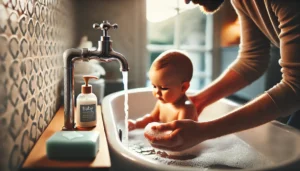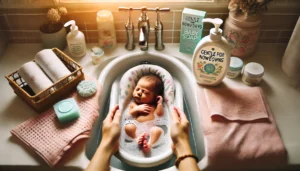Welcoming a newborn into the world comes with so many questions — and one of the most common is, “Do babies really need a special soap?” I’ve been there, standing in the baby aisle, staring at shelves full of “gentle,” “natural,” and “hypoallergenic” products, wondering what’s actually safe for my baby’s delicate skin.
The truth is, newborn skin is incredibly sensitive and different from ours, and using the wrong soap can lead to dryness, irritation, or even allergic reactions.
In this guide, I’ll break down what makes newborn skin unique, why regular soaps might be too harsh, and what experts say about choosing the right soap. You’ll also learn what ingredients to look for (and which to avoid), plus tips for choosing a product that’s safe and effective.
Understanding Newborn Skin
Newborn skin may look soft and flawless, but it’s far more delicate than it appears. In fact, it’s one of the most sensitive parts of a baby’s body. As a parent, knowing how this skin works can help you make smarter choices when it comes to bath time and skincare.
Newborn skin is still developing in the first few months after birth. It’s thinner, more absorbent, and lacks the protective barrier that older babies and adults have. That means it’s more vulnerable to harsh chemicals, environmental irritants, and even changes in temperature or humidity.
The outermost layer of a baby’s skin (called the stratum corneum) is not fully developed at birth. Because of this:
- Moisture can escape more quickly, leading to dryness.
- Irritants can penetrate more easily.
- Skin conditions like eczema or rashes are more likely to occur.
So when it comes to choosing skincare products, the goal should always be to protect and support this developing barrier, not strip it down with strong cleansers.
Want to go plant-based? Learn about the benefits of plant-based baby soaps and whether they’re worth the hype.
How Newborn Skin Differs from Older Babies and Adults
As your baby grows, so does their skin.
By around 6–12 months, the skin becomes thicker, stronger, and less reactive. But at birth:
- Newborn skin is about 30% thinner than adult skin.
- It has a higher pH level, which can affect how it reacts to soaps and detergents.
- It produces less oil (sebum), so it doesn’t self-moisturize like adult skin does.
These differences mean that newborns can’t handle the same products you might use on yourself—or even on a toddler. Soaps that seem “mild” to us might still be too much for a newborn’s skin.
Understanding these differences is the first step in choosing the right skincare and avoiding problems down the road.
Why Regular Soaps Aren’t Suitable for Newborns
It might be tempting to use a family soap bar or your favorite body wash on your baby, especially if it’s labeled “gentle.” But here’s the truth: regular soaps are not made for newborn skin—and they can do more harm than good.
Most adult and general-use soaps:
- Contain harsh surfactants that strip away natural oils.
- Have high pH levels that disrupt a baby’s skin barrier.
- Include synthetic fragrances or dyes that can trigger irritation or allergies.
Curious what’s really inside baby soap? Here’s what you should know about surfactants in baby soaps and why they matter.
Newborn skin needs moisture and protection, not deep cleansing. Using standard soap can leave your baby’s skin dry, flaky, or inflamed. Even a single use can disrupt their skin’s natural balance, leading to redness or peeling.
This is why pediatricians and dermatologists strongly advise parents to skip traditional soaps during the first few months and go for gentler alternatives.
What Makes a Soap ‘Specially Formulated’ for Newborns
So what makes a soap truly safe for newborns? It’s not just about a cute label or pastel packaging. A specially formulated newborn soap is designed with their sensitive skin in mind—every ingredient serves a purpose.
Here’s what sets these products apart:
- pH-balanced (around 5.5) to match the natural pH of baby skin.
- Free from sulfates, parabens, phthalates, and artificial fragrances.
- Infused with gentle moisturizers like glycerin or natural oils.
- Dermatologist-tested for sensitivity and hypoallergenic properties.
Many baby soaps are also tear-free and made with plant-based or minimal ingredients to avoid triggering skin reactions.
These soaps are more than just a trend—they’re backed by science and recommended by pediatricians worldwide. Choosing the right soap helps protect your baby’s skin and keeps it soft, smooth, and healthy from day one.
Need product ideas? Check out the best baby soaps trusted by parents and experts.
Key Ingredients to Look for in Newborn Soaps
When picking a soap for your newborn, less is more—but the ingredients that are included should be soothing, hydrating, and safe. Here are the top ingredients you should look for when buying baby soap:
- Glycerin – A gentle, natural humectant that attracts moisture to the skin.
- Coconut oil – Softens and moisturizes without being harsh.
- Shea butter – Offers deep hydration and protects the skin’s barrier.
- Aloe vera – Soothes inflammation and calms irritation.
- Calendula extract – Known for its calming, anti-inflammatory benefits.
- Oat extract or colloidal oatmeal – Helps relieve dryness and soothe sensitive skin.
Always check the label for these skin-loving ingredients, and make sure they appear near the top of the list for better effectiveness.
Ingredients to Avoid in Baby Skincare
While you want the good stuff in your baby’s soap, it’s just as important to know what to keep out. Certain ingredients, even in small amounts, can irritate a newborn’s fragile skin.
Avoid soaps with:
- Fragrances and perfumes – These can cause allergic reactions and dryness.
- Sulfates (like SLS and SLES) – Harsh foaming agents that strip natural oils.
- Parabens – Preservatives linked to potential hormone disruption.
- Alcohol (especially denatured or SD alcohol) – Dries out the skin and causes stinging.
- Artificial dyes and colorants – Offer no benefit and may irritate sensitive skin.
- Phthalates – Often hidden in fragrance blends and linked to developmental issues.
Always read the full ingredients list, even if the product claims to be “natural” or “safe for babies.” The cleaner the formula, the safer it is for your newborn.
Expert Opinions on Newborn Skincare Needs
Leading pediatricians and dermatologists agree: newborn skincare should be as gentle and minimal as possible.
According to the American Academy of Pediatrics (AAP), newborns don’t need to be bathed daily, and when you do, using a mild, fragrance-free cleanser is key. Over-cleansing or using the wrong soap can disrupt their skin’s natural defenses.
Dr. Mona Amin, a board-certified pediatrician, says:
“Parents should stick to simple, hypoallergenic soaps for the first few months. Harsh ingredients can harm the skin barrier and lead to eczema or chronic dryness.”
Most experts recommend:
- Using only water during the first few days.
- Introducing soap slowly, and only with products labeled safe for newborns.
- Monitoring skin for any reaction after first use.
Wondering if it’s okay to stick with one brand? Here’s what to know about using the same soap long-term.
The takeaway? Trust the science: special soaps aren’t just marketing—they’re a must for healthy baby skin.
Tips for Choosing the Right Soap for Your Newborn
With so many products on the shelf, choosing the best soap for your newborn can feel overwhelming. But it doesn’t have to be. Here are a few simple, practical tips I follow when picking baby soap:
- Read the entire ingredient list, not just the front label.
- Look for products labeled “dermatologist-tested” and “hypoallergenic.”
- Choose fragrance-free over scented, even if it claims to be “baby fresh.”
- Opt for plant-based or natural formulas with minimal ingredients.
- Avoid foaming or bubble bath soaps—these usually contain harsh surfactants.
- Try a patch test on a small area of skin before full use.
Can’t decide between bar or liquid? Here’s a quick look at bar vs liquid soap for babies.
When in doubt, I always ask my pediatrician for a recommendation. A doctor-approved product offers peace of mind, especially for first-time parents.
When to Switch Soaps as Your Baby Grows
As your baby gets older, their skin gradually builds up a stronger protective barrier. Around the 6-month mark, many babies can tolerate slightly richer or more cleansing formulas.
Here’s how I decide when it’s time to switch:
- Watch for signs of skin maturity: less dryness, fewer reactions.
- If your pediatrician gives the green light, you can try introducing a mild foaming cleanser.
- Still stick to fragrance-free and dye-free until your child is at least 1 year old.
- Avoid adult soaps altogether—even toddlers need kid-safe formulas.
The key is to transition slowly and observe how your child’s skin reacts. Every baby is different, so there’s no one-size-fits-all timeline.
Not sure if it’s time to toss the old one? Here’s how to tell if your baby soap has expired.
Conclusion
So, do newborns really need special soap? Absolutely. Their skin is delicate, sensitive, and still developing. Regular soaps just aren’t made for that level of fragility. Choosing a specially formulated, gentle baby soap isn’t just a nice-to-have—it’s essential.
Stick with clean, nourishing ingredients, avoid harsh additives, and always consult your pediatrician if you’re unsure. Your baby’s skin deserves the best from day one—and with the right soap, you’re giving them a healthy start.
Also worth considering: the impact of soap packaging on the environment, especially if you’re eco-conscious.
Still unsure what to choose? Check out our expert-recommended products below. Or drop a comment with your favorite baby soap—we’d love to hear from you!



